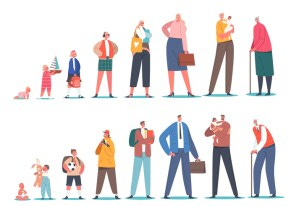Title: Aging, Loss, and Grief, A Human Journey
Ecclesiastes 3:1-2a: “For everything there is a season, and a time for every matter under heaven: a time to be born, and a time to die.”
I am eighty years old. Yesterday, I learned that an old friend I had not seen in decades had died. While news of her passing away was not surprising, it was unsettling. Her passing was another in an increasingly long list of friends who died. It also reminded me of my age and that I have fewer days ahead than when I was younger.
Aging, loss, and grief are integral parts of the human experience. As we travel the terrain of life, these happenings are inevitable and formative. They shape our perspectives, resilience, and understanding of life’s temporary nature. They are often intertwined, with aging being the harbinger of loss and grief and loss and grief providing a deeper understanding of aging.
Aging, The Inescapable Reality
Aging is a universal, inescapable process affecting all living creatures. It signifies the passage of time, represented by physiological changes, cognitive transformations, and adjustments in roles and responsibilities. As we age, we confront a series of losses. There is the loss of youth, strength, health, and sometimes independence. Yet, aging can also bring positive changes, including increased wisdom, the freedom of retirement, and the joy of grandchildren. Paradoxically, while aging can be a source of dread and anxiety, it can also be a source of fulfillment and contentment. But that depends on one’s perspective and experiences.
Loss, The Unavoidable Companion of Aging
As we age, the experience of loss becomes more frequent. This loss can manifest in several ways. These include losing loved ones to health, independence, and professional identity post-retirement. The loss of a friend is a stark reminder of the impermanence of life. It forces us to grapple with vulnerability and fragility, often leading to profound sadness and longing. Through confronting and accepting loss, we learn to value the impermanence of life’s moments, cherishing them for their fleeting existence.
Grief, The Response to Loss
Grief is the emotional response to loss. And it is part of the human condition. It expresses love and attachment, signifying the importance of what has been lost. While often associated with death, grief can stem from any significant loss, such as losing health or independence. It is a deeply personal process, varying in intensity and duration from person to person. Grief can be overwhelming, characterized by sadness, anger, guilt, and confusion. Yet, it also holds the capacity for transformation and growth, guiding us toward acceptance and resilience.
The Interplay of Aging, Loss, and Grief
Aging, loss, and grief are interconnected aspects of life that shape and define our human experience. As we age, we inevitably encounter loss. Loss evokes grief. However, through these challenging experiences, we find strength, resilience, and a deeper appreciation for life.
Our societal views on aging, loss, and grief are often negative. They focus on the pain and sorrow they induce. Yet, these experiences also hold the potential for growth and transformation. Aging can bring wisdom and perspective; loss can cultivate gratitude and appreciation; grief can lead to resilience and a renewed sense of purpose.
Aging, loss, and grief are not merely stages of decline and sorrow. They are integral to our human existence. This provides opportunities for personal growth and transformation. The universal experience of these phenomena underscores the importance of compassion, understanding, and support in our relationships and communities. We can foster a more holistic and empathetic view of the human experience. We can acknowledge the entirety of our journey. Joy, pain, beginnings, endings, love, and loss.
Your comments are welcome. Please use this email address:





